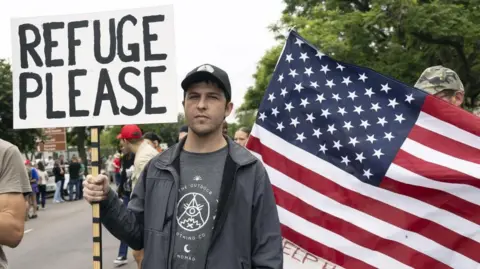In a move that has sparked considerable controversy, South Africa has openly criticized a plan from the United States government to potentially resettle white Afrikaners as refugees. Reports suggest that this decision could be implemented as soon as the following week, prompting strong responses from the South African authorities.
The information regarding the US plan was reportedly obtained by CBS, a partner of BBC News in the United States. This document outlines the resettlement initiative as a “priority” for the Trump administration, although official confirmation from the White House remains absent. The South African foreign ministry, through a recent statement, expressed its disapproval, labeling the initiative as “politically motivated.” They argue that it aims to undermine the integrity of South Africa’s “constitutional democracy.”
Adding to the complexity of the situation, President Donald Trump had previously characterized Afrikaners as victims suffering from “racial discrimination” in February. This executive order initiated discussions about their potential resettlement in the United States, which has raised alarm bells within South Africa regarding the implications of such a narrative.
While South Africa indicated it would not obstruct the departures of those selected for the resettlement program, it insisted on receiving assurances that the individuals chosen had undergone thorough vetting processes and did not have any pending criminal issues. This request reflects the South African government’s intent to ensure that any migration is handled responsibly and with due consideration for national security.
The position of South African authorities is further complicated by claims from various groups who advocate for the rights of white farmers. They assert an ongoing crisis of violence directed specifically at them based on their race, further fueling a contentious narrative around racial dynamics within the country. Conversely, the South African government maintains that allegations of discrimination against the white minority are unfounded. They argue that crime statistics do not suggest that any particular racial group is disproportionately targeted in violent attacks, especially on farms.
Moreover, US officials have made statements indicating that they are in the process of interviewing individuals interested in the resettlement program. Special emphasis has been put on “Afrikaners in South Africa who are victims of unjust racial discrimination.” However, a clear timeline for the initiation of the resettlement process has not been disclosed. The potential move has added strain to US-South Africa relations, particularly given that the Trump administration has previously accused the South African government of seizing land from white farmers without compensation, a charge that Pretoria vehemently denies.
Documents retrieved also suggest that US officials are planning a press event intended to welcome the first group of resettled individuals at Dulles Airport in Virginia, enhancing the anticipation surrounding the program and heightening tensions in the discourse around race and land rights in South Africa.
Through this complex unfolding of events, the situation epitomizes a broader struggle of identity, race relations, and geopolitical dynamics. With almost 70,000 South Africans expressing an interest in seeking asylum in the US and discussions about land redistribution swirling in the background, the intersection of politics, race, and migration continues to provoke deep-seated divisions. South African authorities are keen on asserting their narrative while navigating international scrutiny, calling for a more nuanced understanding of the challenges confronting all citizens, regardless of their ethnic background.
The impacts of this proposed refugee plan highlight how interconnected and controversial issues of race, governance, and human rights remain, not just in South Africa, but globally as well. The attention this situation draws reflects a continuing need for dialogue, understanding, and engagement on these critically urgent topics.



